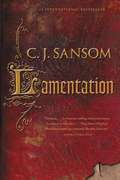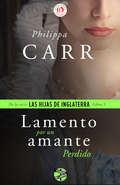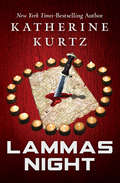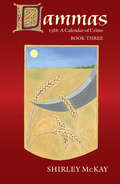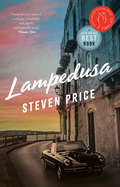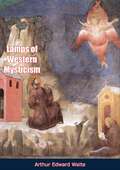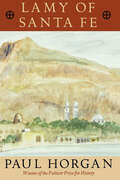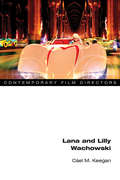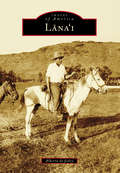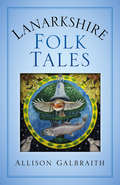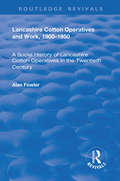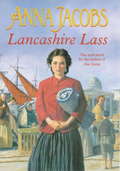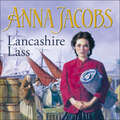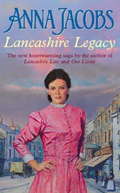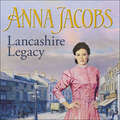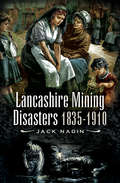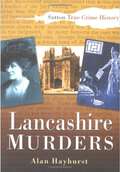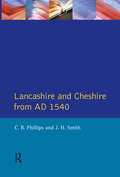- Table View
- List View
Lamentation: A Shardlake Novel (The Shardlake Series #6)
by C. J. SansomAs Henry VIII lies on his deathbed, an incendiary manuscript threatens to tear his court apart. Summer, 1546. King Henry VIII is slowly, painfully dying. His Protestant and Catholic councilors are engaged in a final and decisive power struggle; whoever wins will control the government. As heretics are hunted across London, and radical Protestants are burned at the stake, the Catholic party focuses its attack on Henry's sixth wife--and Matthew Shardlake's old mentor--Queen Catherine Parr. Shardlake, still haunted by his narrow escape from death the year before, steps into action when the beleaguered and desperate Queen summons him to Whitehall Palace to help her recover a dangerous manuscript. The Queen has authored a confessional book, Lamentation of a Sinner, so radically Protestant that if it came to the King's attention it could bring both her and her sympathizers crashing down. Although the secret book was kept hidden inside a locked chest in the Queen's private chamber, it has inexplicably vanished. Only one page has been recovered--clutched in the hand of a murdered London printer. Shardlake's investigations take him on a trail that begins among the backstreet printshops of London, but leads him and his trusty assistant Jack Barak into the dark and labyrinthine world of court politics, a world Shardlake swore never to enter again. In this crucible of power and ambition, Protestant friends can be as dangerous as Catholic enemies, and those with shifting allegiances can be the most dangerous of all.
Lamento por Darley Dene
by Cassia Pereira Stuart G. YatesBaseado em fatos reais. Após a Segunda Guerra Mundial, o garoto Ben descobre uma história sinistra. Em 1941, num bombardeio, soldados morreram exatamente onde está o terreno que costuma jogar. Com os terríveis acontecimentos do passado e o seu lento desdobramento, Ben se envolve em uma série de estranhos, inexplicáveis incidentes, com velhos segredos e verdades ocultas lentamente sendo reveladas. Esta é uma história de autodescoberta e de superação do medo, pois aquilo que está sob o solo é verdadeiramente arrepiante. Ben está prestes a descobrir os segredos de sua família e terá de ajudar a sepultar o horror do que aconteceu em Darley Dene.
Lamento por un amante perdido
by Philippa Carr Estela CantoCuando Arabella Tolworthy huye a Francia, siguiendo el destino del destronado Carlos II, hace amistad con dos seres que cambiarán su vida. Subyugada por Harriet Main, Arabella no sospecha la amenaza que la actriz supone para su felicidad futura. Enamorada de Edwin Eversleigh, no presiente la tragedia que espera a su rápido matrimonio.De regreso en Inglaterra, viuda y encinta del hijo póstumo de Edwin, será otro Eversleigh quien haga tambalear de nuevo los cimientos de su vida. Puede perderlo todo o encontrar un nuevo amor.
Lammas Night
by Katherine KurtzAn ingenious melding of espionage and the occult based in part on a true event in the secret history of the Battle of Britain during World War II. The year is 1940, and Great Britain's forces struggle against the invincible Nazi war machine. France has fallen easily to Adolf Hitler's army and England is next in his sights. A British secret agent pays the ultimate price to deliver early warning of the Führer's secret plan to harness the awesome power of the occult to conquer Great Britain by launching a supernatural assault that no defending military force could possibly deflect. British Intelligence operative Col. John "Gray" Graham of MI6 is not only a valuable player in the great game of wartime espionage, he is also a practitioner of the ancient occult arts. In this life--and other lives before--Gray's destiny has been firmly intertwined with that of his close friend Prince William of the British royal family. Now, with the future of Britain at stake, these two men, the spy and the royal, must rally the hidden adherents of the Old Religion, hoping to unite the British covens in defense of their endangered island homeland. But it will take more than combined Wiccan sorcery to repel the Reich's black magic on Lammas Night--and the sacrifice required might be greater than imagined and truly terrible to endure. Lammas Night is a spectacular feat of creative imagination from the author of the acclaimed Deryni fantasy series. Smart, affecting, and brilliantly conceived, it is an enthralling combination of historical fiction, war novel, and the occult that will appeal to fans of all fantastic literature.
Lammas: 1588: A Calendar of Crime, Book Three
by Shirley McKayA serving girl vanishes in this mystery story set in sixteenth-century Scotland . . . Elspet, a serving girl at the harbor inn, has been told for years by the inn&’s owner, Walter Bone, that she is ugly and that no man will ever want her. Then, after years of being shut away from the world, she unexpectedly catches the attention of a young laborer and realizes she has been lied to all these years. She meets her lover in secret at the Lammas day fair, but her dalliances do not go unnoticed . . . Now Hew Cullan finds himself retained by a man with a mind for murder. Walter Bone makes clear his intent to kill Elspet&’s lover, and seeks Hew&’s help to ensure his will is upheld when he is inevitably hanged for the act. But his jealousy has unexpected consequences. When Elspet disappears without a trace, several innocent fair-goers and patrons are dragged into a web of suspicion, rumor, and accusation. It falls to Hew to unravel the twisted threads and figure out the truth of the matter. &“McKay is to be congratulated for the continued quality and inventiveness of her tales.&” —The National
Lampedusa: A Novel
by Steven PriceFrom the #1 nationally bestselling author of By Gaslight, a novel of exquisite emotional force about love and art in the life of one of the great writers, reminiscent of Colm Tóibín's The Master, or Michael Cunningham's The Hours. <P><P>In sun-drenched Sicily, among the decadent Italian aristocracy of the late 1950s, Giuseppe Tomasi, the last prince of Lampedusa, struggles to complete the novel that will be his lasting legacy, The Leopard. <P><P>With a firm devotion to the historical record, Lampedusa leaps effortlessly into the mind of the writer and inhabits the complicated heart of a man facing down the end of his life, struggling to make something of lasting worth, while there is still time. <P><P>Achingly beautiful and elegantly conceived, Steven Price's new novel is an intensely moving story of one man's awakening to the possibilities of life, intimately woven against the transformative power of a great work of art.
Lamps of Western Mysticism
by Arthur Edward WaiteA truly modern path to the spirit as described by the author of this book does not imply alienation from the demands and requirements of everyday life, but rather enhances man’s ability to live that life more fully, earnestly and fruitfully.This development follows certain definite steps which have as their preliminary goal the harmonizing and balancing of the inner life in terms of objective, ultimate reality. Beyond this, the path opens out to a still higher attainment, culminating in that sublime, conscious oneness with the divine, described in writings of those men and women who have attained at least a first experience of this highest of all goals.This book was written in order to open before us the prospect of this goal, to outline at least the first steps on the path leading to it, and to introduce us to some of the human beings who have achieved noteworthy results in this quest, particularly in the Western World.In simple, straightforward language he outlines the ideals and practice of the spiritual life from the standpoint of the man of the West as he is today, a description entirely free of asceticism and the restrictions of theological dogma.
Lamy of Santa Fe
by Paul HorganOriginally published in 1975, this Pulitzer Prize for History-winning biography chronicles the life of Archbishop Jean Baptiste Lamy (1814-1888), New Mexico's first resident bishop and the most influential, reform-minded Catholic official in the region during the late 1800s. Lamy's accomplishments, including the endowing of hospitals, orphanages, and English-language schools and colleges, formed the foundation of modern-day Santa Fe and often brought him into conflict with corrupt local priests. His life story, also the subject of Willa Cather's Death Comes for the Archbishop, describes a pivotal period in the American Southwest, as Spanish and Mexican rule gave way to much greater influence from the U.S. and Europe. Historian and consummate stylist Paul Horgan has given us a chronicle filled with hardy, often extraordinary adventure, and sustained by Lamy's magnificent strength of character.
Lana and Lilly Wachowski (Contemporary Film Directors)
by Cael M. KeeganLana and Lilly Wachowski have redefined the technically and topically possible while joyfully defying audience expectations. Visionary films like The Matrix trilogy and Cloud Atlas have made them the world's most influential transgender media producers, and their coming out retroactively put trans* aesthetics at the very center of popular American culture. Cáel M. Keegan views the Wachowskis films as an approach to trans* experience that maps a transgender journey and the promise we might learn "to sense beyond the limits of the given world." Keegan reveals how the filmmakers take up the relationship between identity and coding (be it computers or genes), inheritance and belonging, and how transgender becoming connects to a utopian vision of a post-racial order. Along the way, he theorizes a trans* aesthetic that explores the plasticity of cinema to create new social worlds, new temporalities, and new sensory inputs and outputs. Film comes to disrupt, rearrange, and evolve the cinematic exchange with the senses in the same manner that trans* disrupts, rearranges, and evolves discrete genders and sexes.
Lana'i
by Alberta De JetleyLong before neatly cultivated rows of pineapple fields stretched out as far as one could see, demon spirits are said to have made L?na'i uninhabitable for humans. The spirits were banished by a young man from L?haina who is credited with forming the first settlement on the island. Centuries later, in 1778, warriors battled on the island's steep cliffs and drove their enemies to their deaths. Every living thing was destroyed, all except for one man who saved himself by leaping off a cliff into the ocean and swimming to safety. Time heals, and the land endured. When winter storms turned barren slopes green again, the natives returned and were followed in later years by men who carved their names into the history of L?na'i.
Lana's War: A Novel
by Anita AbrielFrom the bestselling author of The Light After the War comes the unforgettable story of a young woman waging her own war against the Nazis as a spy for the Resistance on the French Riviera. Paris, 1943: Lana Antanova is rushing to tell her husband she is pregnant when she witnesses him being executed by a Gestapo officer for hiding a Jewish girl in a piano. Overcome with grief, Lana loses the baby. A few months later, a heartbroken Lana is approached to join the Resistance on the French Riviera. As the daughter of a Russian countess, Lana has the perfect background to infiltrate the émigré community of Russian aristocrats who socialise with Nazi officers, including the man who killed her husband. Lana&’s cover story makes her the mistress of a wealthy Swiss playboy, the darkly handsome and charismatic Guy Pascal, and her base his villa in Cap Ferrat. Together they make a ruthlessly effective team. Consumed by her mission, Lana doesn&’t count on becoming attached to a young Jewish girl or falling helplessly in love with Guy. As the Nazis close in, Lana&’s desire to protect the ones she loves threatens to put them all at risk.
Lana's War: A Novel
by Anita AbrielFrom the author of the &“fast-paced, heartbreaking, and hopeful&” (Kristin Harmel, author of The Room on Rue Amélie) The Light After the War, a riveting and heartfelt story of a young woman recruited to be a spy for the resistance on the French Riviera during World War II. Paris 1943: Lana Antanova is on her way to see her husband with the thrilling news that she is pregnant. But when she arrives at the convent where he teaches music, she&’s horrified to see Gestapo officers execute him for hiding a Jewish girl in the piano. A few months later, grieving both her husband and her lost pregnancy, Lana is shocked when she&’s approached to join the resistance on the French Riviera. As the daughter of a Russian countess, Lana has the perfect background to infiltrate the émigré community of Russian aristocrats who socialize with German officers, including the man who killed her husband. Lana&’s cover story makes her the mistress of Guy Pascal, a wealthy Swiss industrialist and fellow resistance member, in whose villa in Cap Ferrat she lives. Together, they gather information on upcoming raids and help members of the Jewish community escape. Consumed by her work, she doesn&’t expect to become attached to a young Jewish girl or wonder about the secrets held by the man whose house she shares. And as the Nazis&’ deadly efforts intensify, her intention to protect those around her may put them all at risk instead. With Anita Abriel&’s &“heartfelt and memorable&” (Pam Jenoff, New York Times bestselling author) storytelling, Lana&’s War is a sweeping and suspenseful tale of survival and second chances during some of the darkest days of history.
Lanarkshire Folk Tales
by Allison GalbraithFrom a cantankerous brownie in Dolphinton to the vampire with iron teeth who terrorised Glasgow, this collection of tales spans fourteen centuries of Lanarkshire's history and happenings. Here you will find the legends of William Wallace's love and loss in Lanark and Saint Mungo's bitter feud with the Pagan hierarchy and Druids, alongside totemic animals, unique Scottish flora and fauna, warlocks, herb-wives and elfin trickery.Allison Galbraith combines storytelling expertise with two decades of folklore research to present this beguiling collection of Lanarkshire stories, suitable for adults and older children.
Lancashire Cotton Operatives and Work, 1900-1950: A Social History of Lancashire Cotton Operatives in the Twentieth Century
by Alan FowlerThis title was first published in 2003. The cotton industry was one of the major motors that powered Britain's industrial development from the mid-eighteenth century, contributing in no small way to the revolution that was to transform Europe over the next hundred years. The combination of technological developments, colonial exploits and social transformation that all came together in the Lancashire cotton industry provided a perfect example of how the new world would function, its priorities and its ambitions. Into this fast moving and fluid situation, were thrust the men, women and children who formed the vast pool of labour necessary to keep the spindles and looms running. It is their experiences above all, that illuminates the history of the cotton industry, and how it came to change the face of Britain through the nineteenth and early twentieth centuries. In this study, Alan Fowler takes an in-depth look at the Lancashire cotton industry through the prism of its workers, their families and organisations. He argues that by 1850 the triumph of the factory system was complete, and the factory operative a mainstay of a transformed society based on a new economic order. With this increasingly important role in the new economy came opportunities, which cotton workers were not slow to grasp. Crucial to the history of the Lancashire cotton operatives were the collective organisations they established which forced employers and government to treat with them. By the beginning of the twentieth century these organisations had managed to raise wages, improve working conditions, reduce working hours, establish the right to holidays, and force the introduction of factory legislation. This book explores how these victories were won and the impact they had on the industry and wider society.
Lancashire Lass
by Anna Jacobs'Another riveting book from Anna Jacobs' - 5-star reader reviewSeventeen-year-old Liza is happy working as a lady's maid - until her employers decide to emigrate and her father makes up his mind that she is to wed an older widower whom she detests. Determined to avoid a loveless marriage, Liza plans to run away. But when the widower rapes her to force her to marry him, she flees back to the family for whom she worked. She feels she has no choice but to go with them to Australia, and they all set out on the long voyage.On board ship, Liza discovers to her horror that she has fallen pregnant. Even if she can survive the journey, the demanding life of a settler in 1850s Western Australia will be made even harder by an illegitimate child. But Liza is to find that in addition to deprivation of the worst sort, Australia will offer her opportunities she could never have dreamt of back home in Lancashire.*******************What readers are saying about LANCASHIRE LASS'As ever, great!' - 5 stars'A lovely book' - 5 stars'Great from start to finish' - 5 stars'Brilliant again!' - 5 stars'I just love these books - once you start you will find it hard to put down' - 5 stars
Lancashire Lass
by Anna Jacobs'Another riveting book from Anna Jacobs' - 5-star reader reviewSeventeen-year-old Liza is happy working as a lady's maid - until her employers decide to emigrate and her father makes up his mind that she is to wed an older widower whom she detests. Determined to avoid a loveless marriage, Liza plans to run away. But when the widower rapes her to force her to marry him, she flees back to the family for whom she worked. She feels she has no choice but to go with them to Australia, and they all set out on the long voyage.On board ship, Liza discovers to her horror that she has fallen pregnant. Even if she can survive the journey, the demanding life of a settler in 1850s Western Australia will be made even harder by an illegitimate child. But Liza is to find that in addition to deprivation of the worst sort, Australia will offer her opportunities she could never have dreamt of back home in Lancashire.*******************What readers are saying about LANCASHIRE LASS'As ever, great!' - 5 stars'A lovely book' - 5 stars'Great from start to finish' - 5 stars'Brilliant again!' - 5 stars'I just love these books - once you start you will find it hard to put down' - 5 stars
Lancashire Lass: Lancashire Settlers, Book 1
by Anna Jacobs'Another riveting book from Anna Jacobs' - 5-star reader reviewSeventeen-year-old Liza is happy working as a lady's maid - until her employers decide to emigrate and her father makes up his mind that she is to wed an older widower whom she detests. Determined to avoid a loveless marriage, Liza plans to run away. But when the widower rapes her to force her to marry him, she flees back to the family for whom she worked. She feels she has no choice but to go with them to Australia, and they all set out on the long voyage.On board ship, Liza discovers to her horror that she has fallen pregnant. Even if she can survive the journey, the demanding life of a settler in 1850s Western Australia will be made even harder by an illegitimate child. But Liza is to find that in addition to deprivation of the worst sort, Australia will offer her opportunities she could never have dreamt of back home in Lancashire.(P) 2019 Hodder & Stoughton Ltd
Lancashire Legacy
by Anna Jacobs'I felt as if this book was my addiction . . . A truly remarkable author' - 5-star reader reviewAt eighteen, Cathie longs for more than life as a settler in the Australian bush. So when her uncle offers her the chance to send her to England, she grabs the opportunity with both hands and runs away from her family. But little does she know that he is using her to get revenge on his sister, Liza.Attacked at the docks in Liverpool, Cathie takes refuge with the man who saved her, a man who has his own troubles. But as she slowly regains her memory and meets her Lancashire relatives, she must confront the legacy of her mother's past.And even in 1876, the same wealthy families who forced her mother to leave Lancashire are still powerful enough to threaten Cathie's happiness and safety - as well as that of anyone close to her . . .**********************What readers are saying about LANCASHIRE LEGACY'Another brilliant read from Anna. Love it' - 5 stars'Riveting' - 5 stars'Brilliant story, as always. Didn't want it to end' - 5 stars'WOW, such a good read' - 5 stars'I couldn't put this down' - 5 stars
Lancashire Legacy
by Anna Jacobs'I felt as if this book was my addiction . . . A truly remarkable author' - 5-star reader reviewAt eighteen, Cathie longs for more than life as a settler in the Australian bush. So when her uncle offers her the chance to send her to England, she grabs the opportunity with both hands and runs away from her family. But little does she know that he is using her to get revenge on his sister, Liza.Attacked at the docks in Liverpool, Cathie takes refuge with the man who saved her, a man who has his own troubles. But as she slowly regains her memory and meets her Lancashire relatives, she must confront the legacy of her mother's past.And even in 1876, the same wealthy families who forced her mother to leave Lancashire are still powerful enough to threaten Cathie's happiness and safety - as well as that of anyone close to her . . .**********************What readers are saying about LANCASHIRE LEGACY'Another brilliant read from Anna. Love it' - 5 stars'Riveting' - 5 stars'Brilliant story, as always. Didn't want it to end' - 5 stars'WOW, such a good read' - 5 stars'I couldn't put this down' - 5 stars
Lancashire Legacy: Lancashire Settlers, Book 2
by Anna JacobsAt eighteen, Cathie longs for more than life as a settler in the Australian bush. So when her uncle offers her the chance to send her to England, she grabs the opportunity with both hands and runs away from her family. But little does she know that he is using her to get revenge on his sister, Liza.Attacked at the docks in Liverpool, Cathie takes refuge with the man who saved her, a man who has his own troubles. But as she slowly regains her memory and meets her Lancashire relatives, she must confront the legacy of her mother's past.And even in 1876, the same wealthy families who forced her mother to leave Lancashire are still powerful enough to threaten Cathie's happiness and safety - as well as that of anyone close to her . . .(P)2001 Isis Publishing Ltd
Lancashire Mining Disasters 1835-1910
by Jack NadinLancashire Mining Disasters chronicles the effects, death and grief of the local ming communities in Lancashire, through colliery accidents and explosions from the early 1830s through to 1910. It also recalls the great bravery of other miners, often from other pits in the recue attempts, who with no thought of their own safety went below ground to try and their fellow comrades. In doing so, they knew full well that they were risking their own lives, probably facing death. Such was the comradeship in coal mining communities. In no other industry would men grapple at rock and roof falls with bare hands, wade through flooded smoking underground galleries, or face further explosions and deadly suffocating gases in order to try and save their fellow colleagues. And while all this was ongoing, the pit banks filled with the old men, the grieving womenfolk and children, waiting for news of a loved one - a brother, a son, a husband from deep below in a silent hell. As each cage was raised to the pit bank, the crowd lunged forward hoping, perhaps beyond hope, that their loved one was safe. Little wonder there were no carols sung at Christmastide 1910, at Westhoughton and Atherton in South Lancashire for here, a few days before Christmas an explosion followed by a searing hot fiery blast tore through the workings of the Hulton Colliery Companys Pretoria Pit - and in doing so in just a few seconds took away the lives of over three hundred man and boys. This still holds the unwelcome record of the greatest single colliery explosion in English coalming history. It was coal the fulled the steam engines at mills, factories and foundriers which was to make Britain the greatest industrial nation in the world - but what a terrible price the miners paid in putting the Great in Britain. This was the True Price of Coal
Lancashire Murders (Sutton True Crime History)
by Alan HayhurstContained within the pages of this book are the stories behind some of the most notorious murders in Lancashire's history. The cases covered here record the county's most fascinating but least known crimes, as well as famous murders that gripped not just Lancashire but the whole nation. From Liverpool's Florence Maybrick (was she really guilty of poisoning her hypochondriac husband with arsenic and was he indeed Jack the Ripper?) to late Victorian Bury's disturbing 'Body in the Wardrobe' case; from the infamous Drs Ruxton and Clements, who saw off five wives between them, to Blackpool's Louisa Merrifield, whose loose tongue was undoubtedly her downfall, this is a collection of the county's most dramatic and interesting criminal cases Alan Hayhurst has been uncovering evidence about the county's historic murders for more than forty years. In writing this book he has visited all of the murder sites, consulted original documents and contemporary reports, and spoken to those who has personal memories of the cases concerned. Lancashire Murders is a unique re-examination of the darker side of the county's past.
Lancashire and Cheshire from AD1540 (Regional History of England)
by C. B. Phillips J. H. SmithThis series, fully illustrated with maps and half-tones, is written for general readers as well as the student. In illuminating the anonymous lives of our predecessors it will, when complete, substantially enrich our understanding of the many histories which together make up the history of England. This authoritative volume surveys the modern history of the counties of Lancashire, Merseyside, Greater Manchester and Cheshire. In 1540 this was a backward area, poor, underpopulated and conservative. During the seventeenth and early eighteenth century the spread of the first cottage industries to the mills and the mines transformed the region into one of the engines of Britain's nineteenth-century greatness. The causes, the costs and the consequences of that transformation are vividly portrayed in this very readable text. Offers a succinct account and analysis of the first region to experience the developed factory system. Discusses the rise, dominance and decline of the region which has parallels across the country and the world. Provides essential background text for the students of local history. Assumes no previous knowledge of the region.
Lancashire's Historic Pubs
by Peter ThomasIf you enjoy the occasional pub meal, a drink at the bar, or if you're interested in Lancashire's social history, you're sure to find something entertaining in Peter Thomas's introduction to the county's pubs. It opens with a round-up of the history of brewing, pubs and ale-selling, and a section on Lancashire's pub signs, though most of the book is dedicated to an A-Z of over fifty of the most interesting inns. Their history, architecture, ghosts and associated legends are all featured, as well as the exploits of their famous and infamous landlords and landladies. Peter's exhaustive research has resulted in a gem of a book which brings together the proud history, traditions and customs associated with Lancashire hostelries; from ale tasting at the Plough at Eaves to the Britannia Coconut Dancers at the Crown Inn at Bacup. A fascinating journey, with plenty of refreshment stops along the way, this will appeal to anyone with an interest in local history, and those who'd like to know more about the convival surroundings in which they might enjoy a pint.
Lancashire's Seaside Piers: Also Featuring the Piers of the River Mersey, Cumbria and the Isle of Man
by Martin EasdownIn this, a companion volume to his definitive history of Yorkshires pleasure piers, Martin Easdown turns his expert attention westward to the Lancashire coast. His highly illustrated survey of the piers constructed at famous resorts like Blackpool, Morecambe, Southport and St Annes-on-Sea celebrates structures that are among the most exuberant and evocative of the Victorian age. Each of these historic piers has its own character and story, yet all of them represent the optimistic style of the British seaside resort at the peak of its popularity. In those days the Lancashire coast, and Blackpool in particular, became the principal holiday destination for the workers of the nearby industrial towns during their Wakes Weeks. The piers that survive are fascinating relics of that lost age.In this meticulously researched account, Martin Easdown describes how these extraordinary buildings came to be constructed, how they were designed and financed, how they were used, and how hazards beset them fire, storm, ship collision, war damage and ever-present threat of insolvency. His entertaining book reveals and records a neglected aspect of the history of Lancashire and the northwest.
